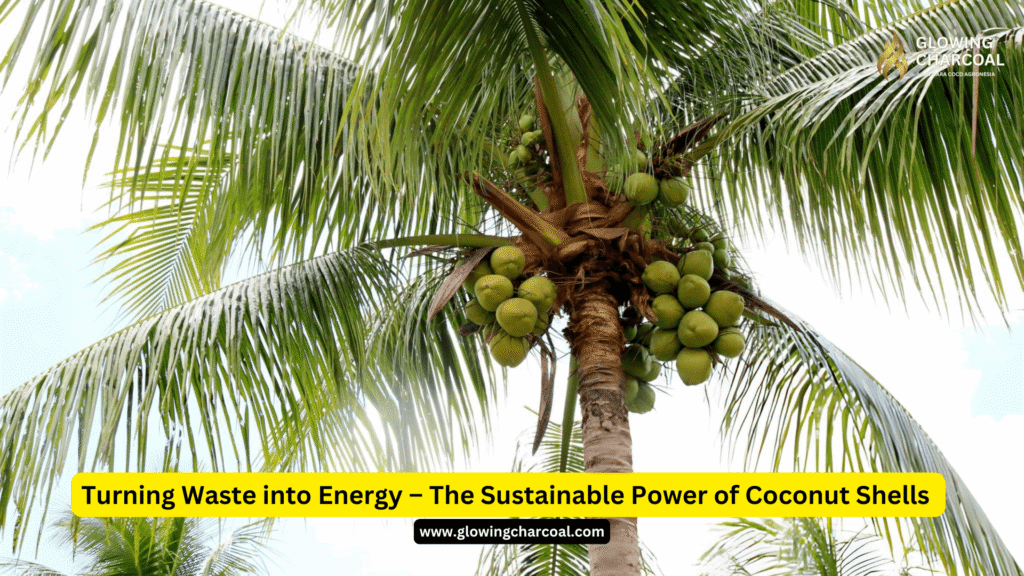Turning Waste into Energy – The Sustainable Power of Coconut Shells

The Hidden Value of the Coconut Shell
In Indonesia, the coconut is known as the “tree of life” — a source of food, drink, and countless daily essentials. But for decades, one part of this miracle fruit was often overlooked: the coconut shell.
Farmers would toss the shells aside after harvesting coconut meat or water, leaving mountains of organic waste to rot or be burned in open air. Yet inside these shells lies a remarkable source of clean energy.
At Glowing Charcoal Indonesia, we’ve found a way to give new life to this byproduct. Through advanced carbonization and briquetting technology, we turn coconut shells into eco-friendly charcoal briquettes that power homes, barbecues, and shisha lounges around the world.
This is the story of how waste becomes energy — and how Indonesia is leading the way toward a cleaner, more sustainable future.
The Global Problem with Waste and Energy
The world faces two major challenges today: waste management and energy demand.
Every year, millions of tons of agricultural waste are produced — often ending up in landfills or being openly burned, releasing carbon and harmful gases. At the same time, global energy consumption keeps rising, much of it still dependent on fossil fuels.
What if the solution to both problems could come from something as natural and renewable as a coconut shell?
Indonesia, the largest coconut producer in the world, generates millions of tons of coconut shells annually. By converting these shells into renewable charcoal energy, we not only reduce waste but also replace polluting fuels like wood charcoal or coal with a cleaner alternative.
From Waste to Wealth: The Transformation Process
The transformation of coconut shells into charcoal is a fascinating process — one that combines traditional knowledge with modern technology.
Here’s how we do it at Glowing Charcoal Indonesia:
Collection – We source coconut shells from trusted farmers and coconut processors across Indonesia. What used to be discarded as waste now becomes a valuable raw material.
Carbonization – The shells are burned in low-oxygen conditions using high-efficiency kilns. This process converts the organic material into pure carbon, removing volatile substances while maintaining energy density.
Crushing and Mixing – The carbonized shells (charcoal) are ground into fine powder and blended with natural binders like tapioca starch.
Briquetting – The mixture is compressed under high pressure into uniform shapes — cubes, hexagons, or pentagons — depending on customer requirements.
Drying and Packaging – Finally, the briquettes are dried, quality-checked, and packed for export.
The result? Premium coconut charcoal briquettes that burn longer, produce less smoke, and generate higher heat — all without cutting down a single tree.
A Sustainable Alternative to Wood Charcoal
Traditional wood charcoal has long been a staple for cooking and heating. However, it comes at a steep environmental cost. Trees are cut down, forests are destroyed, and carbon emissions rise.
Coconut charcoal changes that. It is a 100% renewable resource, made from waste that would otherwise pollute the environment. By choosing coconut shell charcoal, consumers and importers help:
Reduce deforestation
Lower CO₂ emissions
Promote sustainable agriculture
Support rural economies
Each ton of coconut charcoal briquettes produced helps save dozens of trees that would have been felled for wood charcoal. This makes it one of the most environmentally responsible energy choices available today.
Cleaner, Stronger, and Longer Burning
From an energy perspective, coconut shell charcoal outperforms traditional wood charcoal in almost every way.
Higher Calorific Value: Coconut charcoal burns hotter, making it ideal for BBQ and shisha use.
Longer Burn Time: It burns more slowly and evenly, providing stable heat for extended periods.
Low Ash and Smoke: Coconut briquettes leave behind minimal ash and no strong odor, ensuring a cleaner experience.
Consistent Shape and Quality: Industrial briquetting ensures uniform performance — a key factor for professional use.
This makes coconut charcoal not only sustainable but also superior in quality, helping industries and consumers move toward greener choices without sacrificing performance.
Empowering Local Communities Through Sustainability
Beyond environmental benefits, coconut shell charcoal production creates significant social impact in rural Indonesia.
At Glowing Charcoal Indonesia, we work closely with coconut farmers, shell collectors, and small producers. By paying fair prices for raw materials and offering steady employment in production facilities, we help uplift entire communities.
Many of our team members come from rural areas where job opportunities are limited. Through charcoal production, they gain valuable skills, stable income, and long-term livelihoods. Women, too, play a key role — especially in briquetting and packaging — contributing to local economic independence.
Sustainability, for us, means balancing environmental care with human development.
Coconut Shells and the Circular Economy
Our approach perfectly fits the model of a circular economy — where waste is turned into value, and resources are reused rather than discarded.
Coconut shells, once considered a problem, now become the foundation of an entire value chain:
Farmers sell their waste shells for extra income.
Factories like ours turn them into charcoal briquettes.
Exporters ship them to markets worldwide.
Consumers enjoy a cleaner, longer-lasting fuel.
The remaining ash can even be used as organic fertilizer, returning nutrients to the soil.
It’s a complete loop — a system where nothing goes to waste.
The Role of Innovation and Quality Control
Glowing Charcoal Indonesia continuously invests in innovation to make our production even more efficient and environmentally friendly.
Our factories use modern carbonization kilns that minimize smoke emissions, conserve energy, and produce higher yields of charcoal. Every batch goes through rigorous quality control, testing for moisture, ash content, and calorific value before export.
These measures ensure that our clients — from shisha lounges in the Middle East to BBQ brands in Europe — receive consistent, premium-grade coconut charcoal every time.
We believe that sustainability and performance must coexist, and innovation is the bridge between the two.
Indonesia: The Global Hub of Sustainable Charcoal
Indonesia is blessed with ideal growing conditions for coconuts — tropical climate, fertile soil, and abundant natural resources. As a result, the country produces more than 17 billion coconuts annually.
By turning this natural abundance into sustainable energy, Indonesia has become a global hub for coconut charcoal production. Companies like Glowing Charcoal Indonesia represent a new generation of exporters who combine quality, reliability, and environmental responsibility.
Our coconut charcoal briquettes are now shipped worldwide — powering restaurants, shisha cafes, and homes while sharing the story of Indonesia’s green innovation.
A Cleaner Future, One Shell at a Time
As the world transitions toward renewable energy, small innovations like turning coconut shells into charcoal make a big difference. What was once agricultural waste is now a clean, efficient fuel that helps reduce emissions, protect forests, and support communities.
At Glowing Charcoal Indonesia, we’re proud to be part of this change — proving that sustainability can be both practical and profitable. Every briquette we produce represents renewable energy, responsible production, and real human impact.
By choosing Indonesian coconut charcoal, you’re not just buying fuel. You’re investing in a future where waste becomes energy — and energy becomes empowerment.
